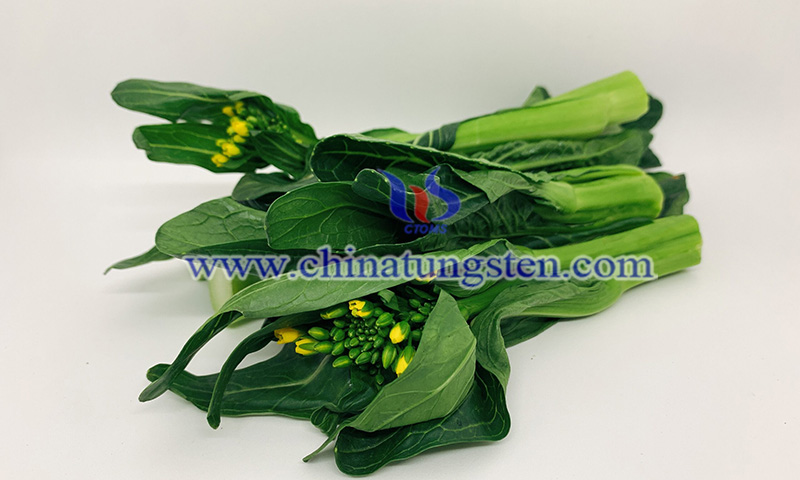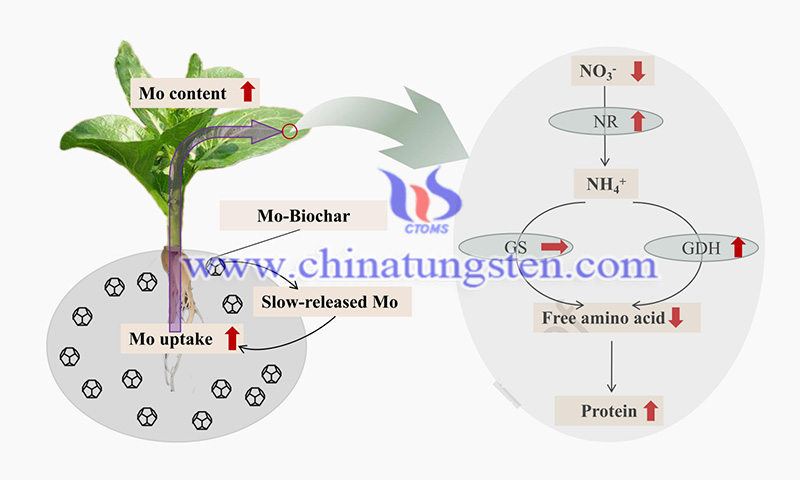Biochar-Based Molybdenum Fertilizer Enhances N Assimilation in Cabbage
- Details
- Category: Tungsten Information
- Published on Monday, 02 May 2022 11:52
Low molybdenum (Mo) bioavailability in acidic soils hinders N assimilation by vegetables, and providing available Mo in acidic soils is a challenge to reduce nitrate accumulation in vegetables. A study conducted by the Institute of Guangdong Academy of Agricultural Sciences investigated three methods of molybdenum application: biochar-based molybdenum fertilizer (Mo-biochar), seed dressing, and basal application to improve Mo bioavailability and N assimilation in cabbage (Brassica parachinensis) in acidic soils.
The results showed that Mo-biochar provided constant and adequate Mo nutrition during cabbage growth in terms of soil available Mo, Mo uptake by plants, and Mo values. The improvement in Mo availability was attributed to the alleviation of acidic soils (pH from 5.10 to 6.99) and the slow release of adsorbed Mo on biochar. Mo-biochar increased nitrate reductase (NR) activity by 238.6% and glutamate dehydrogenase activity by 27.5%, indicating that the rate-limiting steps of N assimilation were enhanced, especially nitrate reduction and amino acid synthesis.
The increase in Mo-contained NR can be directly attributed to high Mo in cabbage. Compared to the control, the nitrate content of Brassica parachinensis decreased by 42.9% due to the decrease in nitrate caused by the increase in NR. In addition, Mo-biochar was beneficial for the growth of vegetables.

On the contrary, due to the low bioavailability of Mo in the soil, seed dressing and basal application hindered the conversion of NO3 to NH4+, resulting in high nitrate content in Brassica parachinensis. The results suggest that Mo-biochar can slowly release Mo and is an effective strategy to mitigate high nitrate accumulation in vegetables grown in acidic soils.
High nitrate intake through vegetables has a negative impact on human health. Metabolites of nitrates increase the risk of stomach cancer, infantile methemoglobinemia, and even teratogenicity, and about 80% of the nitrates consumed by humans come from vegetables.
The accumulation of nitrate in vegetables is closely related to the blocked assimilation of nitrate, which also leads to the deficiency of available nitrogen in vegetables. Therefore, it is crucial to ensure the uninterrupted assimilation of nitrate during vegetable growth.
NO3- is reduced to NO2 catalyzed by NR and then to ammonium nitrite by nitrite reductase (NiR) in vegetables. NR is a soluble Mo cofactor-containing flavoprotein and is the most critical enzyme for N assimilation, which is why Mo deficiency in plants often causes nitrogen deficiency.
In acidic soils, NR deficiency often occurs in vegetables, and the bioavailability of Mo is low due to the combination of Mo with Fe-Al. Globally, about 70 percent of arable land is acidic. In China, up to 4 million hectares of arable land suffer from Mo deficiency. As a result, nitrates can easily accumulate in vegetables, leading to high health risks in Mo -deficient areas.
Providing molybdenum fertilizer is an important way to increase enzyme synthesis and thus reduce nitrate accumulation. However, molybdenum fertilization is rarely applied. The consistent availability of available molybdenum fertilizer is a challenge to reduce nitrate accumulation in vegetables.
The combination of molybdenum and organic matter prevents molybdenum loss and increases the efficiency of biochar-based molybdenum fertilizer. Cabbage is one of the most widely grown, produced, and consumed vegetables in China. Due to its nitrate-loving characteristics, Brassica parachinensis usually holds a high nitrate content.
The study confirmed the effectiveness of Mo-biochar in reducing nitrate accumulation and increasing N assimilation by vegetables in acidic soils. Mo-biochar ensured adequate Mo supply in acidic soils through neutralization of the environment and slow release. As a result, the Mo uptake rate of B. parachinensis remained high throughout growth and the biochar-based molybdenum fertilizer utilization efficiency was substantially increased.

(Credit: Yongdong Huang/Chemosphere)
The promotion of molybdenum-containing NR activity and GDH activity by Mo-biochar was the main pathway for N assimilation. The enhanced assimilation promoted N uptake, improved N fertilizer use efficiency, improved acidic degraded soils, and facilitated cabbage growth with improved yield and quality. Molybdenum-biochar can be an effective strategy to mitigate high nitrate accumulation in vegetables grown in acidic soils.
The study titled “Biochar-based molybdenum slow-release fertilizer enhances nitrogen assimilation in Chinese flowering cabbage (Brassica parachinensis)” has been published in the journal of Chemosphere (2022). The study was carried out by Yongdong Huang, Yongjian Chen, Dian Wen, Peihua Zhao et al. at the Institute of Guangdong Academy of Agricultural Sciences.
| Molybdenum Supplier: Chinatungsten Online www.molybdenum.com.cn | Tel.: 86 592 5129696; Fax: 86 592 5129797;Email:sales@chinatungsten.com |
| Tungsten News & Prices, 3G Version: http://3g.chinatungsten.com | Molybdenum News & Molybdenum Price: http://news.molybdenum.com.cn |



 sales@chinatungsten.com
sales@chinatungsten.com